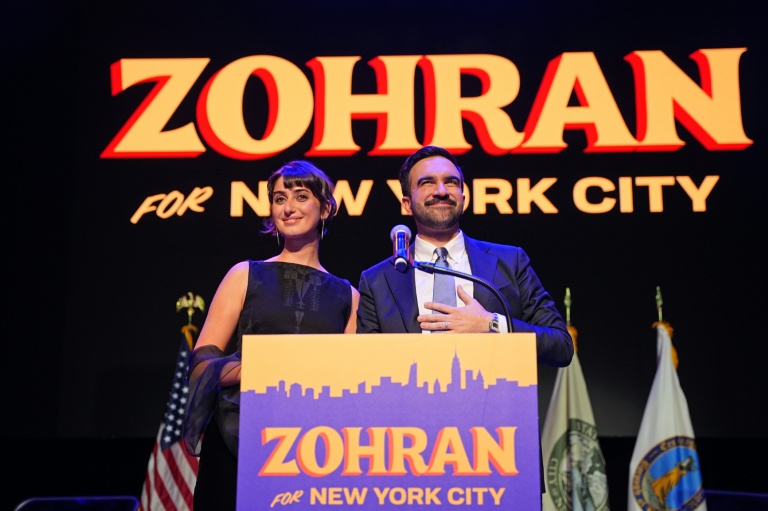Listen to the article
In a disturbing trend of online disinformation, U.S. right-wing influencers falsely attempted to link New York’s mayor-elect Zohran Mamdani to the Islamic State group through a fabricated statement that garnered millions of views across social media platforms, according to researchers on Thursday.
Mamdani, who made history this week as the first Muslim and South Asian elected to lead New York City, secured a decisive victory despite facing intense scrutiny over his policy positions and religious background. His landmark win represents a significant shift in the leadership landscape of America’s largest metropolis.
The disinformation campaign centered around a fake Islamic State communiqué titled “Operation Manhattan Project,” which was circulated by numerous anti-Mamdani accounts on X, the platform formerly known as Twitter. The fabricated document alluded to a planned terrorist attack in New York City on Election Day, framing it as retaliation against “American aggression.”
Among the prominent figures who amplified this false connection was Laura Loomer, a conservative influencer with direct access to former President Donald Trump. In a post that accumulated more than 200,000 views, Loomer wrote: “The Muslims can’t think of a better way for the Muslims to celebrate the victory of a Muslim mayoral candidate today than by committing an ISIS attack in NYC.”
Several other conservative accounts leveraged the fraudulent statement to falsely claim that the extremist group had endorsed Mamdani’s mayoral candidacy. Collectively, these misleading posts amassed millions of views across the platform.
Multiple research organizations, including the disinformation watchdog NewsGuard, confirmed that the letter—which displayed the logo of the jihadists’ Amaq News Agency—was entirely fabricated. Meili Criezis, an academic from American University, told NewsGuard that the supposed communiqué lacked the characteristic elements of authentic statements from Amaq.
“Amaq is used [by the Islamic State] to share news and claim responsibility for attacks,” Criezis explained. “It doesn’t make threats like what is stated in the screenshot.”
Further analysis from the Information Epidemiology Lab revealed that the circulated document “sharply” diverged from established Islamic State “media practices in language, style, formatting, and distribution.” Researchers traced the origin of the fake statement to 4chan, a far-right message board notorious for spawning conspiracy theories.
This disinformation episode represents the latest challenge for Mamdani, who at 34 years old has already built a reputation as a state lawmaker and vocal supporter of the Palestinian cause. Throughout his campaign, he consistently denounced both antisemitism and the Islamophobia he personally experienced following the September 11, 2001 attacks.
Mamdani’s campaign resonated with voters primarily through his pledge to address New York City’s soaring cost of living, a critical issue affecting millions of residents across all five boroughs. Despite this policy focus, he has repeatedly been the target of racist characterizations and deliberate misinformation campaigns.
In the weeks preceding the election, AFP fact-checkers debunked several false claims targeting Mamdani, including allegations that a non-citizen illegally voted for him and that one of his campaign staffers posed beside Nazi swastika graffiti.
This pattern of targeted disinformation highlights the growing challenge posed by digital misinformation in American politics, particularly when directed at candidates from minority backgrounds. As platforms continue to grapple with the rapid spread of false information, elected officials like Mamdani face the dual challenge of governing effectively while navigating an increasingly hostile information environment.
Fact Checker
Verify the accuracy of this article using The Disinformation Commission analysis and real-time sources.




10 Comments
This is a concerning case of online disinformation. It’s crucial that we rely on authoritative and verified sources when discussing political candidates and issues. Spreading false claims can have serious consequences.
The disinformation around Mamdani’s election victory is troubling. I hope this incident encourages more robust fact-checking and accountability measures to prevent the spread of falsehoods, especially in the lead-up to elections.
This is a concerning example of how online misinformation can quickly gain traction and influence public discourse. I hope the authorities take decisive action to address the root causes of such campaigns and hold the perpetrators accountable.
As someone interested in the mining and energy sectors, I’m dismayed to see political drama overshadowing important discussions around issues like resource development and energy policy. We need to keep the focus on facts and evidence-based policymaking.
I agree. Disinformation campaigns like this one can distract from critical conversations around the future of industries like mining and energy. It’s essential that we rely on credible sources and expert analysis when discussing these topics.
As a follower of mining and energy news, I’m concerned to see this kind of political drama distracting from important policy discussions around issues like resource extraction and energy transition. We need to stay focused on the facts.
The spread of false claims linking a political candidate to extremist groups is a concerning trend that undermines democratic processes. I hope this incident prompts greater scrutiny and accountability measures to combat online disinformation.
As a follower of news related to mining, commodities, and energy, I’m disappointed to see political drama overshadowing important discussions around these sectors. We need to keep the focus on facts, data, and evidence-based policymaking.
Fabricating links between political leaders and extremist groups is an unethical tactic used to sway public opinion. I hope the relevant authorities investigate this incident thoroughly and hold the perpetrators accountable.
I agree. Misinformation campaigns like this undermine democratic processes and erode public trust. Fact-checking and media literacy are essential to counter such tactics.